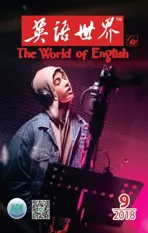Dying to Survive: A Dark Comedy About Smuggling in Cancer Drugs from India
2018-11-28黄茵茵孟洁冰
文/黄茵茵 译/孟洁冰
“Over the years since I became ill, the drugs have cost me my home and bled my family dry. Sir, can you tell me which family doesn’t have a patient, and can you guarantee that you’ll have a lifetime free of illness?”
[2] The words are spoken by an elderly Chinese leukemia1leukemia 白血病。patient to a policeman confiscating her smuggled cancer drugs in the movie Dying to Survive, which opened nationwide on July 5. It won acclaim when it debuted at the Shanghai Film Festival in June and raked in a record $200m in its opening weekend on a budget of just $15m.
[3] Based on the true story of a businessman who became a savior for hundreds of leukemia patients struggling to pay for expensive imported drugs,it’s a rare example of a domestic movie that dares to tackle the cruel realities of middle-class life in China—in this case,the extraordinary lengths families go to in order to obtain life-saving medicines.
“我生病吃药这些年,房子吃没了,家人被我吃垮了。领导,谁家能不遇上个病人,你就能保证你这一辈子不生病吗?”
[2]在7月5日全国上映的电影《我不是药神》中,一位患白血病的中国老太太对收走她走私抗癌药的警察说了这番话。这部影片在6月的上海国际电影节上首次放映就赢得好评,凭借仅有1500万美元的制作成本,创下首映周末2亿美元的票房纪录。
[3]这部电影改编自一个商人的真实故事,他成为了数百名难以负担昂贵进口药的白血病患者的救世主。作为国产电影少有的典范,本片敢于触及中国中产阶级生活的残酷现实——在这种情况下,患者家庭为了得到救命药而费尽心思。
No ordinary drug lord
[4] Dying to Survive tells the story of Cheng Yong, a peddler of oils intended to cure erectile dysfunction, who is approached for help by a leukemia patient who can’t afford the fictional Geliening,a Swedish drug that costs some 40,000 yuan ($6,032) a bottle. The patient asks Cheng to procure the generic version from India, which costs just a fraction of the price.
[5] After realizing the enormous profits to be made, Cheng puts together an unlikely team of smugglers—including a mom who’s stripping to pay for her daughter’s leukemia treatments, and a priest. The film draws its lighter moments from Cheng’s irate reactions to his encounters in India, where he travels to buy the medicine. Cheng is played by Xu Zheng, a well-known Chinese comedic actor who co-produced the film with Ning Hao, a director known for making low-budget comedy films.
[6] Cheng’s character is based on the true story of Lu Yong, a textile trader who was diagnosed with leukemia, and spent more than $80,000 on Gleevec,a very effective treatment that wasn’t covered at the time under national health insurance. Manufactured by Swiss pharmaceutical firm Novartis, it cost the equivalent of $32 for a single pill. Lu located a generic substitute in India—and then helped get it to at least 1,000 other leukemia sufferers in China.
不平凡的药神
[4]《我不是药神》讲述了程勇的故事,他是出售壮阳印度神油的商贩,有位白血病患者由于买不起“格列宁”而找到他求助,这种虚构的瑞典药物每瓶售价高达4万元(约合6032美元)。这位病人恳求程勇从印度代购仿制药,因为仿制药的价格只是原厂药的零头。
[5]在看到赚取巨额利润的商机后,程勇组成了不可思议的走私团队,包括为了给女儿支付白血病治疗费而跳脱衣舞的单亲妈妈和一位神父。在前往印度买仿制药的过程中,各种遭遇让程勇大发脾气,也构成这部电影中轻松幽默的片段。中国著名喜剧演员徐峥饰演程勇,他和以制作小成本喜剧片出名的导演宁浩共同担任了本片的监制。
[6]程勇的角色改编自陆勇的真实经历,这位纺织品企业老板被诊断出患有白血病,他服用格列卫的费用高达8万多美元,这种药物疗效很好,当时却没有纳入全国医保范围。瑞士诺华制药公司生产的格列卫在中国的售价约为每片32美元。陆勇在印度找到了替代的仿制药,后来至少帮助中国的1000名白血病患者买到了这种药品。
[7] The unapproved drug was considered counterfeit under Chinese law, and in 2014, Lu was arrested and charged with selling fake drugs. During his more than four months in detention, some 300 leukemia patients petitioned for his release. Lu was freed in 2015, with the prosecutor noting that he had never personally pro fited from the sales. After his story came to light, many drew parallels with Dallas Buyers Club—the 2013 film about a man who sells unregulated AIDS drugs to fellow HIV sufferers.
[8] In the Chinese movie, Cheng starts off looking to make money but gradually develops compassion for the patients. At one point, Cheng stops smuggling because of the risks involved. When a patient commits suicide because he can’t afford to pay his medical bills, Cheng resumes procuring the Indian drug for Chinese patients—but no longer pro fits from it.
A rare mirror to China’s problems
[9] The issue of huge out-of-pocket drug costs is one many moviegoers in China will recognize. Some 40% of the country’s healthcare spending is on drugs, a far higher share than in many countries. About a third of healthcare spending falls on individuals.
[7]依照中国法律的规定,这种未经批准的药物属于假药,陆勇在2014年因涉嫌销售假药而被逮捕。在他被拘留的4个多月里,大约有300名白血病患者请求释放他。由于检察官认定陆勇本人未从销售仿制药中获利,他在2015年被释放。在他的故事曝光后,许多人将其和《达拉斯买家俱乐部》相提并论,这部2013年上映的电影讲述了患有艾滋病的男主人公向病友出售未经批准的艾滋病药物的故事。
[8]在这部国产电影中,程勇最初是为了赚钱,但是逐渐对病人产生了同情。有一次,程勇因为卷入风险而停止走私。等到有位病人因为无力支付医药费而自杀后,程勇重新开始为中国患者购买印度仿制药,但是不再从中牟利。
中国问题的罕见写照
[9]巨额自付药费的问题会得到很多中国观众的认同。在中国医疗卫生支出中,药品的费用占到了40%左右,这个比例远远高于许多国家,而个人自费支出大约占三分之一。
[10] Last year, China announced plans for reforms to reduce the drug burden on patients and cover more vital drugs under national insurance. Patients taking Gleevec, which began to be covered last year, now only pay around 20% of the sticker price. As of this year, China added a slew of patented drugs from multinationals to its national health insurance plan, securing massive price reductions(paywall2paywall付费门槛。) in exchange for covering them. And even as China exchanged threats of trade tariffs with the US this year, it scrapped tariffs on imported cancer drugs from May 1. Previously import taxes varied from 3% to 6%.
[11] China’s state medical-insurance administration announced in June that it had invited ten foreign and eight domestic drug companies for “negotiations”in a bid to drive down prices. On July 10th the food and drug authority said it would speed up approval of foreign drugs. Bruce Liu of Fudanin, a healthcare consultancy in Shanghai, predicts that cinema-goers’ spirited reaction will prompt the government to include more drugs on its public-reimbursement scheme.
[10] 2017年,中国公布了医改计划,以减轻患者的医药费用负担,将更多的重点药物纳入国家医保范围。格列卫在去年开始纳入医保,服用这种药品的病人现在只需承担20%左右的药费。到今年为止,中国在国家医疗保险计划中增加了大量跨国公司生产的专利药物,以大幅降价为条件把这些药品纳入医保目录。尽管今年中美两国相互要加征关税,但是中国从5月1日起取消了进口抗癌药的关税,此前进口药税率从3%到6%不等。
[11] 2018年6月,中国国家医疗保障局宣布,邀请10家外资药企和8家内资药企进行“商谈”,以降低药品价格。7月10日,国家食品药品监督管理局表示将加快外国药品的审批速度,上海医疗咨询公司复旦光华的董事总经理刘宇刚预测,电影观众的热烈反响将促使中国政府把更多药物纳入公共报销范围。
[12] On Douban, Dying to Survive has a rating of 9/10 from over 100,000 users. In addition to applauding its heartwrenching depiction of life for China’s cancer patients, viewers admired the film for its courage to go beyond the commercially-driven blockbuster fare that fills China’s big screens.
[13] “We often hear people asking why China can’t make movies that change society, like South Korea and India,” wrote Douban user Xu Ruofeng.“We need more writers and film makers to confront the problems of society, and make more films with a conscience.” ■
[12]在豆瓣上,10多万用户给《我不是药神》打了9分(满分为10分)的高分。除了为本片对中国癌症患者生活令人揪心的描写喝彩,观众还欣赏这部电影超越充斥中国大银幕的商业大片的勇气。
[13]“经常听到有人问,为什么中国拍不出韩国和印度那样改变社会的电影。”豆瓣用户徐若风写道,“我们需要更多的创作者和电影人站出来直面社会问题,拍摄更多有良知的电影。” □
